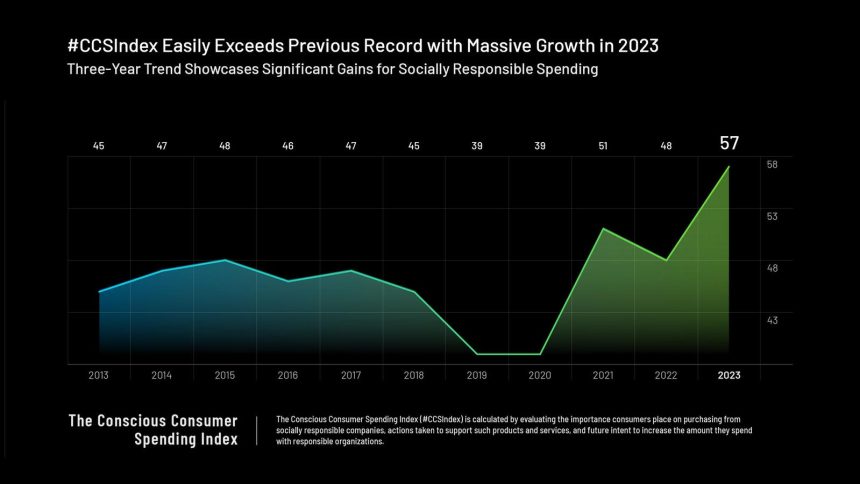The 2024 Consumer Spending Index (CCSIndex) reveals a complex landscape of socially responsible consumerism, marked by declining spending yet a narrowing partisan gap in attitudes. This annual benchmarking study, conducted by Good.Must.Grow, a socially responsible marketing consultancy, assesses consumer appetite for ethical purchasing, charitable giving, and environmentally conscious practices. While the overall index score of 50 represents a 12% decrease from the previous year, it remains the third-highest score since the index’s inception in 2013 and significantly higher than the 37 recorded in 2019. This suggests that while spending may have fluctuated, the underlying commitment to conscious consumerism remains relatively strong. Simultaneously, charitable giving experienced a surge, with 59% of respondents reporting financial contributions to nonprofits, the highest level since 2017. This contrasting trend indicates that while economic pressures might be impacting purchasing decisions, the desire to support social good persists through alternative avenues.
The CCSIndex employs a comprehensive methodology, evaluating the importance consumers place on purchasing from socially responsible companies, the actions they take to support such businesses, and their intentions to increase spending with these organizations. Even minor fluctuations in the index score signify substantial shifts in consumer sentiment due to the algorithm’s design. The recent decline in spending can be attributed, in part, to economic pressures, with half of the respondents citing the cost of socially responsible products and services as a primary barrier, representing an all-time high. This aligns with the observed decline in the success rate of socially responsible intentions, dropping to 55% from the higher percentages in the 60s and 70s seen in previous years. This indicates a significant gap between intention and action, likely driven by financial constraints.
An intriguing correlation emerged between optimism and consumer spending. Respondents who expressed a positive outlook on the world’s trajectory exhibited considerably higher index scores compared to those with more pessimistic or neutral views. Interestingly, the lowest scores were recorded among those who perceived the world as neither improving nor worsening, suggesting a sense of apathy and a belief that individual actions have minimal impact. Conversely, those who believed the world was deteriorating demonstrated a greater propensity towards socially responsible spending, perhaps driven by a sense of urgency and the belief that their actions could contribute to positive change. This highlights the complex interplay between individual worldview, perceived efficacy, and consumer behavior.
The political landscape also plays a significant role in shaping attitudes towards socially responsible consumerism, although the divide appears to be diminishing. Between 2020 and 2024, Republican voters demonstrated a 25% increase in their CCSIndex score, compared to a 6% rise among Democrats. This suggests a growing convergence in values across the political spectrum, at least in the realm of consumer behavior. Despite this narrowing gap, distinct differences remain. Supporters of Kamala Harris in the last election registered a score of 56, noticeably higher than non-voters (45) and Donald Trump voters (44). This persistent difference indicates that political affiliation continues to influence consumer choices, even as the overall gap shrinks.
The CCSIndex also tracks brand perception by asking respondents to name the company or organization that first comes to mind when considering social responsibility, without any prompting. For the sixth consecutive year, Amazon secured the top spot, receiving double the mentions compared to the Salvation Army, which ranked second. This dominance is striking, particularly considering that Amazon outperformed recognized socially responsible organizations like Patagonia, the American Red Cross, Goodwill, and Habitat for Humanity. This result raises intriguing questions about public perception and the factors that contribute to a company’s perceived social responsibility, especially in the context of ongoing debates surrounding Amazon’s labor practices and environmental impact.
In conclusion, the 2024 CCSIndex reveals a nuanced picture of socially responsible consumerism. While economic pressures have contributed to a decline in spending, the overall commitment to ethical and sustainable practices remains robust, as evidenced by the historically high index score and increased charitable giving. The narrowing partisan gap suggests a potential convergence in values, although political affiliation continues to influence consumer choices. The unexpected prominence of Amazon in the public’s perception of socially responsible organizations highlights the complexity of brand image and the need for deeper analysis of the factors driving consumer perceptions. Moving forward, it will be crucial to monitor these trends and understand how economic conditions, political discourse, and corporate actions intersect to shape the future of conscious consumerism.



